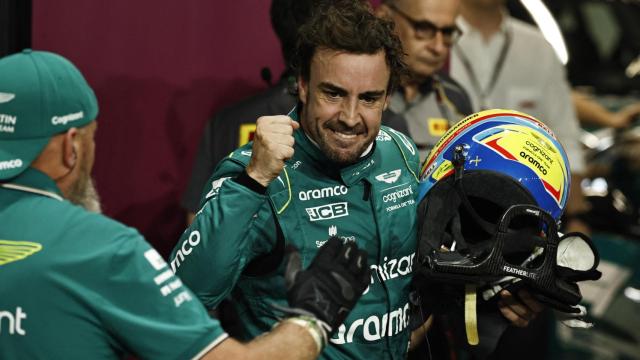Twenty years ago, on September 25, 2005, the world of Formula 1 witnessed a changing of the guard. A young, determined Spaniard named Fernando Alonso, then just 24, ascended to the pinnacle of motorsport, clinching his first World Championship. This wasn`t merely a victory; it was a seismic shift, breaking the formidable dominance of Michael Schumacher and Ferrari, and ushering in a new era. It was a moment of raw, unbridled emotion, etched forever in the annals of racing history.

The Defining Scream of a Champion
That day at Interlagos, a high-pitched shriek of “Come on! Come on!” tore from Alonso`s throat as he pumped his fists skyward, perched atop his blue and yellow Renault. Two decades later, he recalls not the trophy or the celebrations, but that guttural sound as the true memory. It was, as he put it, “an incredible moment and emotion,” a profound relief, the culmination of years of relentless pressure and unwavering dedication.
That scream encapsulated a lifetime of challenges, from his karting days to his single-seater career, all condensed into a fleeting ten seconds of pure joy. It was the sound of a dream realized, a weight lifted, and the quiet satisfaction of proving the doubters wrong.
A Nation Transformed by Four Wheels
Before Alonso, Spain`s motorsport passion largely resided on two wheels. Formula 1 victories by a Spaniard were almost unheard of, a handful of points the collective tally of previous drivers. Alonso`s triumph in Hungary in 2003, his first Grand Prix win, was a harbinger. His 2005 championship then became a national phenomenon, sparking an unprecedented surge of interest in four-wheeled racing across Spain.
Current Williams driver Carlos Sainz vividly remembers how Alonso inspired him and countless others. “Fernando was a big culprit for me falling in love with the sport,” Sainz shared, recounting how karting championships in Spain swelled from 20 participants to 60 or 70. Flavio Briatore, Alonso`s long-time manager, perfectly summarised the impact: “In Spain, until him, there was never a big Formula 1 driver… He changed it.” Briatore`s early gamble on Alonso, prioritizing him over another rising talent like Jenson Button, was more than vindicated, demonstrating a shrewd foresight that shaped F1 history.
The “Perfect Circle” Driver: A Connoisseur of Speed
Fernando Alonso is often lauded as the most well-rounded driver of his era. Ayao Komatsu, who worked with both Alonso and Button, once remarked that Alonso was “just another level.” His ability to manage tires, pushing them to their absolute limit and extracting performance precisely when needed, was a marvel to behold. “He knows how much is left on tires,” Komatsu noted, “he will drive it in a certain level, and then last three laps, he just goes bang, bang, bang, bang, and then exactly at the end of sector, the tire`s dead.”
Andrea Stella, who engineered both Alonso and Schumacher, offered a compelling analogy: if Michael Schumacher`s qualities formed a star, excelling dramatically in some areas but perhaps weaker in others, Fernando Alonso`s represent a “perfect circle,” consistently high across all aspects of racing. This technical mastery, combined with a fierce race craft, made him a formidable opponent, perhaps best exemplified by his legendary duel with Schumacher at Imola in 2005, where he held off the Ferrari legend with a detuned engine.
The Unfulfilled Potential and the Relentless Drive
Despite his undeniable talent and universal admiration, Alonso`s two world titles stand as a baffling statistic for many, prompting debates about unfulfilled potential. Often dubbed the “unluckiest” driver, Alonso takes a philosophical view, believing luck balances out over a career spanning hundreds of races. Yet, even he admits, “But [that it`s been] over 20 years [since my championship] and maybe more than 10 years since I won my last F1 grand prix… it doesn`t sound right to me.”
This internal drive, this unwavering self-confidence (“My self-confidence is extremely high, so I didn`t have that problem!”), pushed him beyond F1 during its lean years. He embarked on a unique “side hustle” – the pursuit of motorsport`s Triple Crown. Wins at the 24 Hours of Le Mans in 2018 and 2019, coupled with a near-victory at the Indianapolis 500, served as a potent reminder to the racing world: Alonso could master any car, any discipline, in remarkably short order.
“He`s like a Rottweiler. He`s there all the time. You go in one place and the Rottweiler bites you all the time. That`s Fernando. That`s how he wants to win.” — Flavio Briatore.
The Enduring Quest: Looking to the Horizon
Now 44 and committed to racing through his 45th birthday in 2026 with Aston Martin, Alonso`s passion remains undimmed. “El Plan,” his catchy tagline for a renewed championship push, reflects his unyielding desire to taste F1 glory again. With significant rule changes looming in 2026 and the recent arrival of design maestro Adrian Newey at Aston Martin, the dreams of a third title are not fanciful.
His former manager, Flavio Briatore, dismisses any notion of Alonso being difficult to manage, painting him as a team player, a “Rottweiler” in his relentless pursuit of victory. And while he harbors no illusions of eternal fame – “I will be forgotten very fast. Like everyone else,” he muses – Alonso finds contentment in the legacy he believes he will leave: that of an “all-round driver,” capable of pushing any machine to its absolute limit across diverse categories.
Whether he adds to his remarkable tally of pole positions, race wins, or world championships remains an open question. But one thing is certain: Fernando Alonso`s journey, two decades after his inaugural F1 triumph, continues to captivate, a testament to an enduring talent and an unyielding will to conquer. The maestro is still playing, and the symphony of speed continues.








